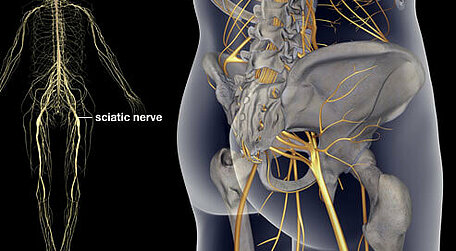The sciatic nerve, the largest nerve in the human body, runs from the lower back, under the buttock and downward through the hip area into each leg. Sciatica means that the sciatic nerve is compressed or irritated, causing mild to intense pain and tingling in the left or right leg. The pain may be made worse by sneezing, coughing, or sitting for a long period of time. Sciatica is a symptom of a spinal disorder and not a spinal disorder itself.
Sciatica: Causes, Diagnosis and Treatment Options
Introduction: What is Sciatica?

Diagnosing Sciatica: Symptoms, Risk Factors, and Diagnostic Tests
Who Gets Sciatica and Why?
Disc degeneration results from the natural ageing of the discs between the bones in the spine. In the vast majority of cases, sciatica is caused by a herniated or 'slipped' disc, which can put pressure on the sciatic nerve. Also, the disc material contains an acidic chemical irritant that can cause nerve inflammation.
Less common causes include spinal stenosis which is a narrowing of the nerve passages in the spine, a spinal injury or infection.
Your doctor will review your medical history, a physical and neurological examination, and if warranted, x-rays, CT scan and/or MRI studies. Sometimes you can be given a pain diagram to illustrate the pain distribution and sensation.
Treatment Options for Sciatica: From Home Remedies to Surgery
Home Treatment and Pain Management for Sciatica
Many cases of sciatica will resolve in around 6 weeks without the need for treatment. However, a combination of things you can do at home - such as taking over the counter painkillers, exercising and using hot or cold packs - may reduce the symptoms until the condition improves.
Professional Treatment Options for Persistent Sciatica
In more persistent cases, you may be advised to follow a structured exercise programme under the supervision of a physiotherapist, have injections of anti-inflammatory and painkilling medication into your spine, and/or take stronger painkilling medication.
When Surgery May Be Necessary for Sciatica
In rare cases, surgery may be needed to correct the problem in your spine.

EUROSPINE is a society of spine specialists of various disciplines with a large knowledge of spine pathologies. All well-known and accepted treatment modalities for spine pathologies are represented by the members of the society. However, the Society cannot accept any responsibility for the use of the information provided; the user and their health care professionals must retain responsibility for their health care management.